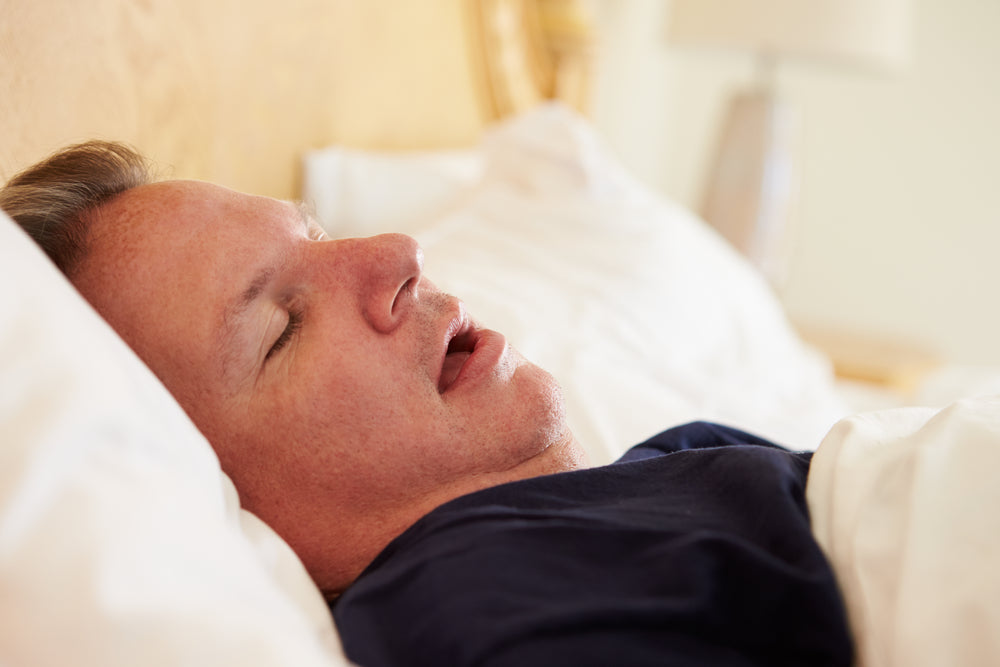Odds are you’ve been unable to sleep at some point because someone you were sleeping next to was snoring like a freight train. You may have been jarred awake one too many times by your own snoring or even jostled awake by your partner in an attempt to get you to quiet down or roll over. Snoring is extremely common, but the causes of snoring can range from the boring and mundane to down right dangerous. We want to give you some insight on what causes snoring and whether or not you should look into treatment for your nighttime cacophony.
Sleep Style or Disorders
One of the most harmless causes of snoring is due to your sleep position. Those who prefer sleeping on their backs are most susceptible to excessive or regular snoring. When you sleep, the muscles in the back of your throat sag and can cause partial or total obstruction of your airway—leading to snoring. An easy solution is to train yourself to sleep on your side or stomach to mitigate any sagging and reduce the likelihood of frequent snoring.
If, however, your snoring is not dependent on your sleep position then there is a possibility you could be suffering from sleep apnea. Sleep apnea and snoring are linked at a truly alarming rate. Sleep apnea is a condition that prevents you from getting the proper air you need to remain in deep sleep. The average adult experiences up to 5 apnea events per hour, but anything over 5 per hour is cause for alarm.
Sleep Apnea
While the mechanics of sleep apnea are fairly straightforward, many people don’t understand the frightening side effects and future medical conditions that sleep apnea can put you at risk for. Because sleep apnea prevents you from getting restorative, healthy sleep on a regular basis, it can put you at increased risk for conditions like heart attack, heart failure, stroke, Type 2 diabetes, obesity, hypertension, and even cancer.
Because of the incredible link between regular, severe snoring and sleep apnea, combined with the risks of untreated sleep apnea, it is imperative that you undergo a sleep study to see if your diagnosis requires treatment—like a continuous positive airway pressure, or CPAP, machine.
Anatomy Problems
Many times, snoring can be a side effect of your individual mouth, throat, and nasal anatomy. If you have a low, thick soft palate (top, back portion of your mouth), it can lead to a narrowed airway that is predisposed to cause snoring when the mouth and throat muscles relax during sleep. If you have a large tongue, or extra tissue—like tonsils or adenoids—in the back of your throat, this can also cause vibrations and blockage that leads to occasional snoring, especially if you’re a back sleeper.
Your uvula—or the soft, triangular piece of tissue that dangles from your soft palate—can also cause issues if it’s elongated, causing further obstruction and vibration in the airway. This small piece of soft tissue can also become enlarged or inflamed if you are suffering from a cold, flu, or other infection. Similarly, your nasal cavity may experience blockage during sickness, forcing you to breathe through your mouth during sleep, worsening these issues.
Your nose can be a central cause of snoring if you have any issues that cause difficult or inhibited nasal breathing. Conditions like excess scar tissue, a broken nose, or deviated septum can cause different kinds of snoring that inhibit sleep for you and anyone sleeping near you.
Lifestyle Choices
While many of the issues listed above are biological, they can be difficult or expensive to remedy. But there are many lifestyle choices that can increase your likelihood of snoring. There is a strong correlation between obesity and snoring because of the excess tissue and lost muscle tone resulting from weight gain. It’s not uncommon for those who experience weight gain to develop a new snoring habit. When the excess tissue grows, especially around the throat and chest region, it can have a significant impact on your sleep habits. If you believe your snoring is the result of weight gain, the best course of action is to create a healthy diet and exercise plan to help alleviate the pressure on your airways through weight loss.
Another common lifestyle cause of snoring is alcohol consumption. While some doctors used to recommend a drink before bed as a sleep aid, it’s become increasingly obvious that alcohol can actually disturb and distort your sleep, increasing your snoring frequency. Alcohol is a potent muscle relaxer, which can cause the muscles in and around your airway to sag more than usual, causing increased vibration and obstruction when you sleep. Because it can override your built-in biological defenses against snoring, it can also be a dangerous habit in the long-term and cause significant issues with sleep hygiene and health.
Snoring affects a large portion of the population, and there is no real root cause for any individual’s tendency to snore at night. It can happen regularly or only once in a great while, but you do need to understand the root causes of your specific snoring and seek out treatment if it indicates a deeper problem. Because of the incredible link between snoring and sleep apnea, it’s imperative that you seek out more information and consider taking a sleep study to understand your condition and if it requires treatment. Getting great sleep in the first step towards feeling better in all aspects of your life and cultivating total-body health and wellness.

